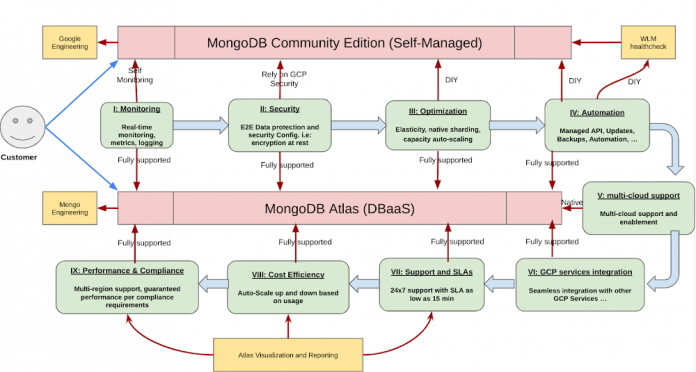If you want to run MongoDB on Google Cloud, we’ve got you covered. You can choose from MongoDB Atlas, or MongoDB Community Edition. But based on customer feedback, we know it can be difficult to choose the right deployment option for MongoDB on Google Cloud. In this blog, we’ll help you choose the right MongoDB model, so you end up with the right database to suit your needs.
MongoDB types
As mentioned earlier, MongoDB is available on Google Cloud Marketplace in two flavors: Community Edition and Atlas:
The Community Edition version is a free, open-source, IaaS model database that offers a flexible document data model along with support for ad-hoc queries, secondary indexing, and real-time aggregations to provide powerful ways to access and analyze your data.
MongoDB Atlas is a fully-managed cloud database that handles all the complexity of deploying, managing, and managing Mongo database deployments on Google Cloud. We believe MongoDB Atlas is the best way to deploy, run, and scale MongoDB in the cloud.
Selection criteria
Choosing the right MongoDB type on Google Cloud is very important because it will help you target the right database model early enough in the process, which will help you avoid potential pain points and friction in the future.
When recommending the best MongoDB database type, we look at five (5) criteria:
Monitoring
Automation
Backup
Optimization
Security
Let’s take a look at each one.
Monitoring: Assess your ability to perform the following activities:
Monitor query performance
Monitor real-time performance
Alerting
Deployment and validation metrics
Logging
Third-party integrations
Automation: Assess your ability to perform the following activities:
Fully Managed API
CI/CD
Health checks
Configuration management
Drifts from best practices
Events handling
Backup: Assess your ability to perform the following activities:
Backup
Restore and archive Data
Backup scheduling
Retention and on-demand snapshots
Optimization: Assess your ability to optimize the following activities:
Query performance
Elastic scalability
Native sharding
Capacity auto-scaling
Self-healing
Security: Assess your ability to perform the following activities:
End to end data protection with preconfigured security features for authentication, authorization
End to end encryption
Network isolation
Role-based access management
And much more
Decision-tree logic
After evaluating the above five criteria, here’s a snapshot of the decision-tree logic to go through to determine the right MongoDB database model to deploy on Google Cloud.
MongoDB Atlas vs. Community, at a glance
Here’s a snapshot of the differences between MongoDB Atlas and Community editions:
What about the cost?
Today, there is a misconception that deploying Atlas on Google Cloud is more expensive than self-managing MongoDB on Google Cloud (Community Edition). While we acknowledge the higher upfront cost of an Atlas deployment, it’s worth to highlight that in the long run, Atlas will be the most cost-effective option for deploying MongoDB workloads on Google Cloud. Here’s a detailed cost study that shows the cost comparison between the two types of MongoDB databases after only the first year of service:
In short, if you want a fully managed, fully scalable and a guaranteed high performance MongoDB solution in the cloud without taking on the burden of supportability and manageability, then MongoDB Atlas is the way to go. If you want more autonomy, sole ownership and control over your MongoDB cluster(s) in the cloud, consider the MongoDB Community edition on Google Cloud. Please let us know which one you chose and why.
Cloud BlogRead More


